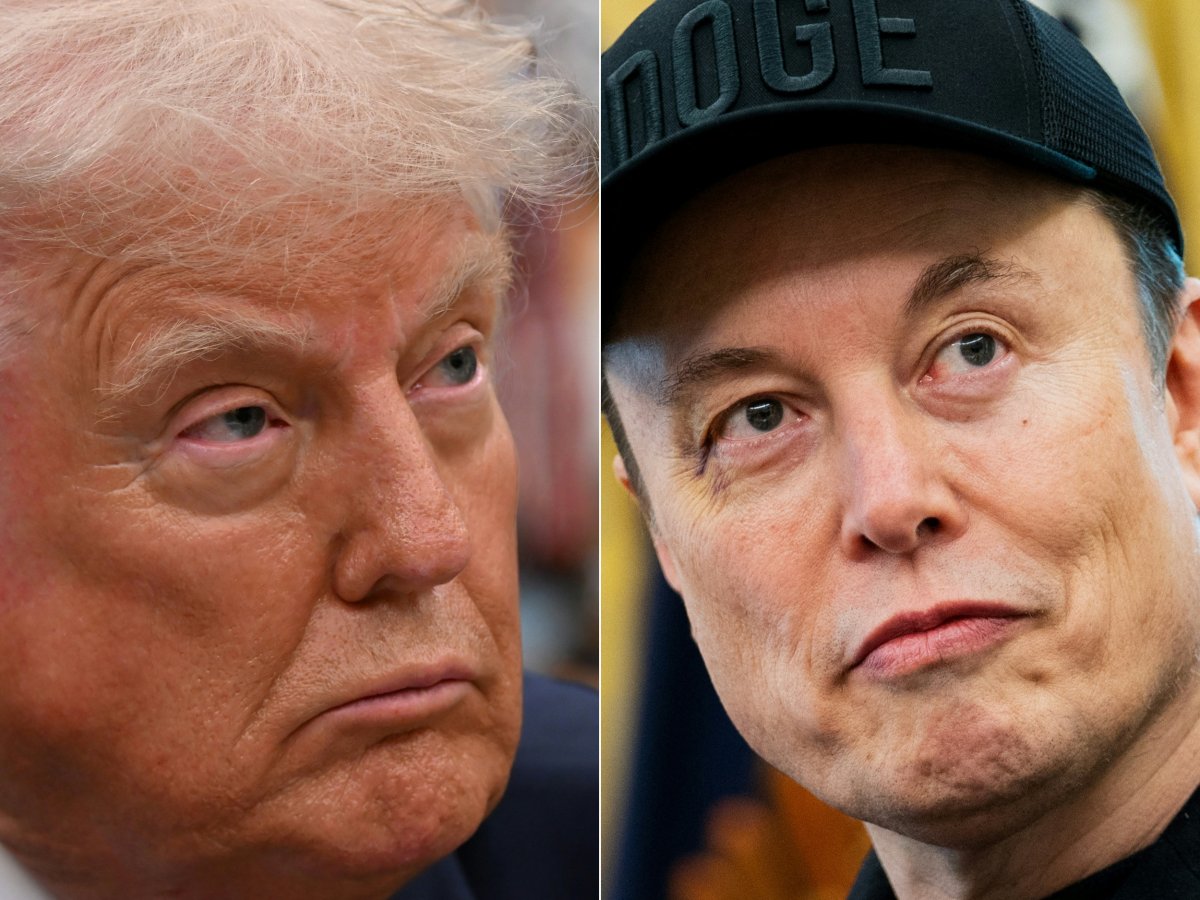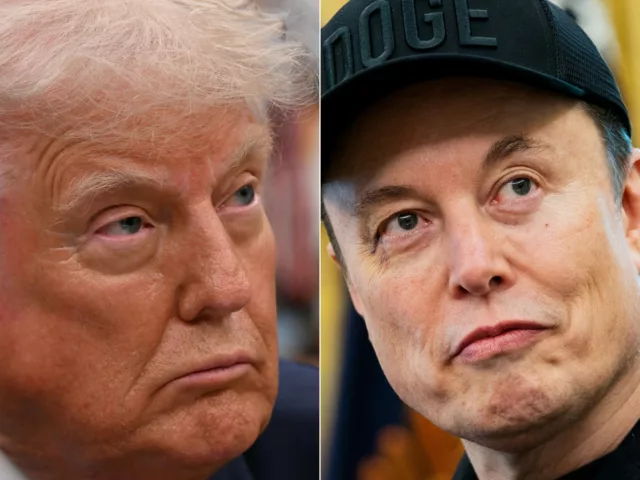The current Trump-Musk relationship breakdown could seriously turn the war of words into a material conflict. For billionaire Elon Musk, the threat by President Donald Trump to remove Tesla‘s subsidies, especially against the shadows of a U.S.-China trade war, would be disastrous as Tesla is not only the poster child of American excellence, but more importantly the only U.S. electric vehicle (EV) manufacturer that is a peer competitor to the behemoths of China’s EV producers, especially BYD. Should Telsa be collateral damage, China will dominate the global EV market.
Starting with fawning platitudes, the relationship between the world’s richest man and the world’s most powerful man has come to an acrimonious end. Both were armed with their own social media companies, spewing ad hominem attacks, with vexatious claims playing out in public.
At the end, both are at fault as they should have seen this coming.

This combination of pictures created on June 5, 2025, shows President Donald Trump in the Oval Office of the White House, in Washington, D.C., on May 5, 2025, and Elon Musk in the Oval Office of the White House in Washington, D.C., on May 30, 2025.
ALEX WROBLEWSKI,ALLISON ROBBERT/AFP via Getty Images
Tesla, SpaceX, X (formerly Twitter), Starlink, and Musk’s other interests are susceptible to the White House’s wrath. Musk in return has floated the need for another political party, while Trump has threatened Musk if he decides to support the Democrats in the midterm elections. Overwhelmingly, the power rests with Trump.
As Tesla receives $7,500 in federal tax credits for each EV sold, the rhetoric alone has seen Tesla’s stock price plummet 14.2 percent on June 5, dropping its market cap to approximately $900 billion while Musk’s own wealth dropped $8.73 billion.
The optics of this is not just a bad look for Trump but the U.S. as a whole. This very public dust-up can be seen as another notch in the deteriorating state of the U.S. body politic. And as this unfolds, its main economic competitor, China, quietly grinds along.
For the remainder of the 21st century, the industries of the future will be defined by the Internet of Things—many to do with artificial intelligence (AI) and sustainability with emphasis on renewable energy production and reduction of carbon emissions. EV’s are a vital component in this.
The U.S. based Information Technology and Innovation Foundation’s Hamilton Center on Industrial Strategy publishes the Hamilton Index that measures and tracks the changes of 10 advanced industrial sectors. Its findings for 2023 showed China 70 percent more specialized than America in these advanced industries. Moreover, the research showed China produced more than any other nation—and more than all other nations outside of the top 10 combined. The same report predicts this trend to only increase.
The importance of EV’s to China as an industry has been earmarked since 2001, with manufacturers receiving in subsidies $231 billion from 2009 to 2024, and with no signs of abating. Consequently, global EV sales from January 2024 to September 2024 were dominated by BYD (2.6 million), Tesla (1.29 million) then BMW, Wuling, and Li Auto (with the last three averaging 370,000 each).
Moreover, the International Energy Agency predicts the share of EV’s in the marketplace to exceed 40 percent by 2030.
With the numbers above, and along with Tesla’s demand shrinking globally, both Tesla and the U.S. cannot afford to have both Chinese and European EV’s takeover globally as it is the only U.S. peer competitor. Should Tesla be collateral damage between the two men, it will counter the Trump narrative of bringing back manufacturing to the U.S.
If ever there was a time where the U.S. copied China, it is here where Tesla was made a national champion, much like China has done in the past. Moreover, the likes of Musk are a vital ingredient in the cultivation of entrepreneurship in the U.S., the very bedrock of the U.S.’ economic prosperity. Though the turbulence of the present is slowly deteriorating the gloss of the U.S. as the start-up capital of the world, it is still the overwhelming destination for entrepreneurs. This is something no other country can compete with in the foreseeable future.
Nonetheless, beset with political hyper-partisanship, the U.S. cannot afford to put individualistic political gains above economic interests of the country. But this seems to be falling on deaf ears.
As such, the need for cooler heads to prevail is an imperative.
Ultimately, the power rests with Trump. If he can turn a new leaf and salvage matters, it would be a positive reversal. With the U.S.’ foes sitting back and watching with glee, should Tesla become collateral damage in the war between Trump and Musk, it would not only shatter the attempt of repatriating manufacturing, but also add to the decline in U.S. primacy, and in the long run benefit China.
Dr S. George Marano is founder and principal consultant of RBV Consulting Group, a boutique strategic management consulting firm. Dr. Marano is also an academic, holding a PhD in strategic management and international business.
The views expressed in this article are the writer’s own.









